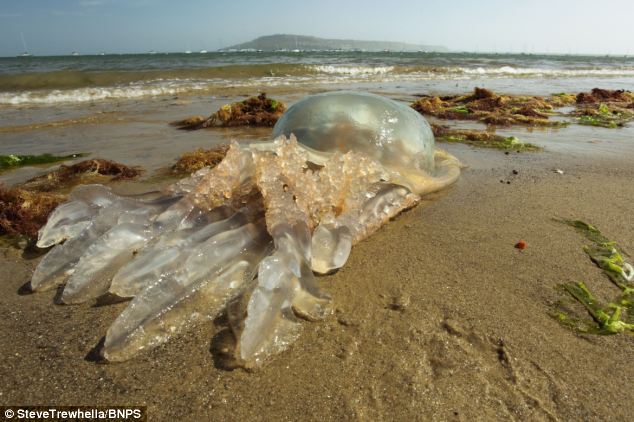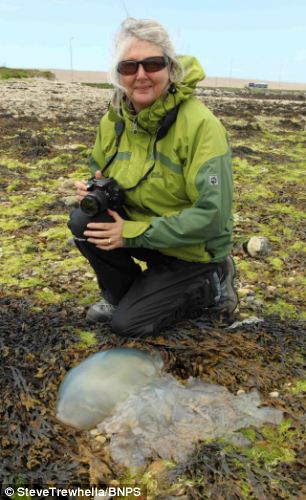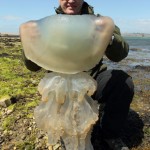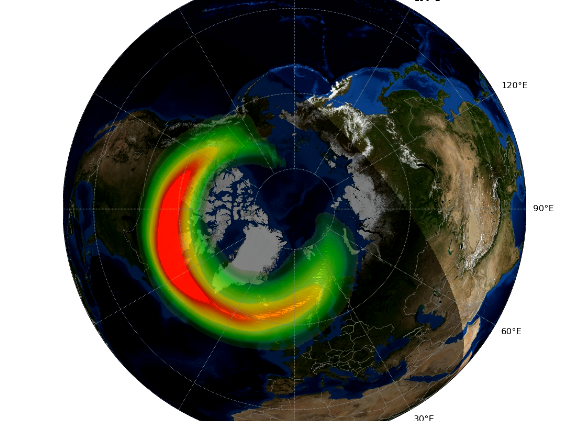It looks as though it’s lying in wait to sting unsuspecting beachgoers.
But in fact this giant jellyfish is harmless to humans – and a long way from home. Usually found in the Atlantic or the Mediterranean, the creature was spotted by wildlife photographer Steve Trewhella in Portland, Dorset, and is one of ten seen recently along the south coast.
Experts say there could be an influx of these barrel jellyfish – up to 3ft 2in in diameter – over the next few months due to warmer weather.

‘Invasion’: The latest in a string of barrel jellyfish sightings has been reported on a beach in Portland, Dorset. Above, wildlife photographer Steve Trewhella poses with the enormous creature, measuring 3ft in diameter
Richard Harrington of the Marine Conservation Society said: ‘Although this species is harmless … we still advise the public not to touch them.’
It comes just days after a jellyfish the size of a dustbin lid was sighted on the island by dog walker Suzanne Sheldon.
Following her discovery, Ms Sheldon, 47, said: ‘It was at least three feet in width and was very bulky too. It was the largest jellyfish I had ever seen.’
Experts have warned that there could be an influx of the sea creatures as the weather warms up.

Enormous: Experts have warned that we could see an influx of the sea creatures as temperatures soar to 20C toward the end of May. Above, the jellyfish which was spotted by the 49-year-old photographer, from Wareham

High numbers: In recent weeks, up to 10 barrel jellyfish have been spotted washed up on beaches around the south coast. Left, the jellyfish spotted by Mr Trewhella and, right, local Julie Hatcher poses with another jellyfish
Mr Harrington added: ‘This is an Atlantic species and are sometimes found washed up but we still advise the public not to touch them.’
But Mr Trewhella believes the creatures have come ashore because of strong winds and high tides.
‘It’s not that unusual to see jellyfish, they aren’t particularly common in Dorset but we do see them every once in a while,’ said the photographer.
‘Jellyfish are a form of plankton, and the warm weather means we might see an increase in the levels of plankton.
‘This is something that occurs around this time every year and it is known as the plankton boom.
‘However, it is not the warm weather that causes jellyfish to wash up, instead it’s the wind and tides that leave them stranded on beaches.
‘I think we will see more strandings because of the on-shore winds and the tides, but people should be careful not to touch them.’
Barrel jellyfish – Rhizostoma pulmo in Latin – are often known as dustbin-lid jellyfish because of their enormous size.
They are commonly found in the north east Atlantic, Adriatic, and Mediterranean sea and are prey to leatherback turtles.
Experts have warned that some of the jellyfish can sting and anyone affected should seek medical attention.








 Photographer Finds Locations Of 1960s Postcards To See How They Look Today, And The Difference Is Unbelievable
Photographer Finds Locations Of 1960s Postcards To See How They Look Today, And The Difference Is Unbelievable  Hij zet 3 IKEA kastjes tegen elkaar aan en maakt dit voor zijn vrouw…Wat een gaaf resultaat!!
Hij zet 3 IKEA kastjes tegen elkaar aan en maakt dit voor zijn vrouw…Wat een gaaf resultaat!!  Scientists Discover 512-Year-Old Shark, Which Would Be The Oldest Living Vertebrate On The Planet
Scientists Discover 512-Year-Old Shark, Which Would Be The Oldest Living Vertebrate On The Planet  Hus til salg er kun 22 kvadratmeter – men vent til du ser det indvendigt
Hus til salg er kun 22 kvadratmeter – men vent til du ser det indvendigt  Superknepet – så blir snuskiga ugnsformen som ny igen!
Superknepet – så blir snuskiga ugnsformen som ny igen!  Meteorite That Recently Fell in Somalia Turns Out to Contain Two Minerals Never Before Seen on Earth
Meteorite That Recently Fell in Somalia Turns Out to Contain Two Minerals Never Before Seen on Earth  Nearly Frozen Waves Captured On Camera By Nantucket Photographer
Nearly Frozen Waves Captured On Camera By Nantucket Photographer  It’s Official: Astronomers Have Discovered another Earth
It’s Official: Astronomers Have Discovered another Earth 